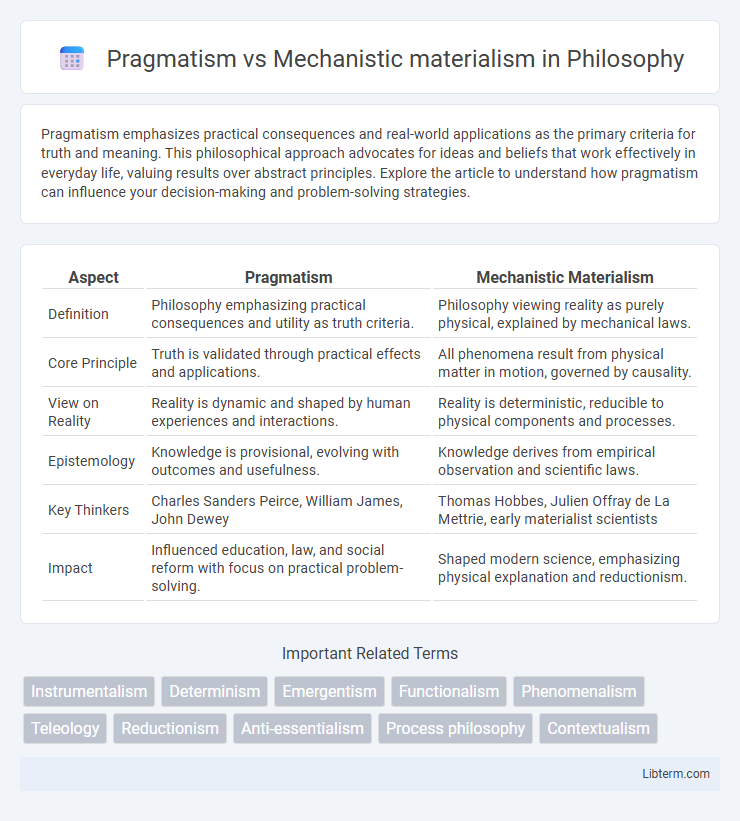Pragmatism emphasizes practical consequences and real-world applications as the primary criteria for truth and meaning. This philosophical approach advocates for ideas and beliefs that work effectively in everyday life, valuing results over abstract principles. Explore the article to understand how pragmatism can influence your decision-making and problem-solving strategies.
Table of Comparison
| Aspect | Pragmatism | Mechanistic Materialism |
|---|---|---|
| Definition | Philosophy emphasizing practical consequences and utility as truth criteria. | Philosophy viewing reality as purely physical, explained by mechanical laws. |
| Core Principle | Truth is validated through practical effects and applications. | All phenomena result from physical matter in motion, governed by causality. |
| View on Reality | Reality is dynamic and shaped by human experiences and interactions. | Reality is deterministic, reducible to physical components and processes. |
| Epistemology | Knowledge is provisional, evolving with outcomes and usefulness. | Knowledge derives from empirical observation and scientific laws. |
| Key Thinkers | Charles Sanders Peirce, William James, John Dewey | Thomas Hobbes, Julien Offray de La Mettrie, early materialist scientists |
| Impact | Influenced education, law, and social reform with focus on practical problem-solving. | Shaped modern science, emphasizing physical explanation and reductionism. |
Introduction to Pragmatism and Mechanistic Materialism
Pragmatism emphasizes practical consequences and human experience as the basis for meaning and truth, valuing ideas that effectively solve problems in real-world contexts. Mechanistic materialism, grounded in classical physics, explains all phenomena by physical interactions and deterministic laws, reducing mental processes to mechanical operations of matter. These contrasting frameworks shape philosophical inquiry by prioritizing either pragmatic utility or strict material causality.
Historical Background and Philosophical Foundations
Pragmatism emerged in the late 19th century through thinkers like Charles Sanders Peirce and William James, emphasizing practical consequences and experiential verification as the basis of truth and meaning. Mechanistic materialism, rooted in the Scientific Revolution and philosophers like Descartes and Newton, advocates that all natural phenomena, including human thought and behavior, can be explained through physical processes and causal mechanisms. The philosophical foundation of pragmatism centers on anti-absolutism and the dynamic nature of knowledge, while mechanistic materialism relies on determinism and reductionism to interpret reality.
Core Principles of Pragmatism
Pragmatism emphasizes practical consequences and real-world applications as the core criteria for truth, valuing ideas based on their effectiveness in solving problems and guiding action. It rejects fixed dualisms and instead promotes a dynamic, evolving understanding of knowledge, where truth is not absolute but contingent on experience and context. This approach contrasts mechanistic materialism, which views reality as governed by deterministic laws and physical components, prioritizing reductionist explanations over adaptive, outcome-oriented thinking.
Core Tenets of Mechanistic Materialism
Mechanistic materialism asserts that all natural phenomena, including human thoughts and behaviors, are results of physical interactions governed by the laws of physics and chemistry. It emphasizes a reductionist approach, breaking down complex systems into their simplest mechanical parts to understand the whole. Core tenets include determinism, where every event is causally determined by prior physical states, and the rejection of any non-material or spiritual explanations for existence.
Contrasting Views on Reality and Knowledge
Pragmatism views reality as dynamic and knowledge as evolving through practical experience and problem-solving, emphasizing the usefulness of ideas in real-world applications. Mechanistic materialism sees reality as a fixed, physical system governed by cause-and-effect laws, with knowledge arising from objective observation and analysis of material phenomena. These contrasting perspectives highlight pragmatism's focus on adaptive understanding versus mechanistic materialism's emphasis on determinism and empirical data.
Approaches to Science and Inquiry
Pragmatism approaches science and inquiry by emphasizing practical consequences and the usefulness of ideas through experiential verification and adaptive problem-solving. Mechanistic materialism relies on deterministic laws of nature, focusing on physical causality and reduction of phenomena to fundamental components through empirical observation and experimentation. Both frameworks shape scientific methodologies, with pragmatism promoting flexible, outcome-oriented inquiry and mechanistic materialism driving precise, cause-and-effect analysis.
Human Experience: Meaning vs. Mechanism
Pragmatism emphasizes human experience as a dynamic interplay of meaning, where beliefs and actions are continuously tested through practical outcomes and personal growth. Mechanistic materialism views human experience as the result of physical processes and biological mechanisms, reducing consciousness and meaning to neural interactions and chemical reactions. This fundamental difference highlights pragmatism's focus on context and purpose, contrasting with mechanistic materialism's emphasis on causality and objective function.
Ethics and Values in Both Philosophies
Pragmatism emphasizes ethics as practical and context-dependent, valuing actions based on their consequences and promoting flexibility in moral decision-making. Mechanistic materialism views ethics through a deterministic lens, often reducing values to biological or physical processes, implying that moral behavior arises from natural laws rather than intrinsic principles. Pragmatism's focus on adaptability contrasts with mechanistic materialism's fixed, cause-effect interpretation of ethical phenomena.
Criticisms and Debates: Pragmatism vs. Mechanistic Materialism
Pragmatism faces criticism for its perceived relativism and lack of fixed truths, contrasting with mechanistic materialism's challenge of reducing complex experiences to deterministic physical processes. Mechanistic materialism is debated for ignoring subjective human experiences and consciousness by focusing solely on material causes. These critiques highlight ongoing philosophical tensions regarding the nature of reality, knowledge, and human experience.
Contemporary Relevance and Applications
Pragmatism emphasizes practical consequences and experiential learning, influencing contemporary fields such as education, psychology, and policymaking by promoting adaptive problem-solving and innovation. Mechanistic materialism, rooted in a scientific and reductionist view of reality, underpins advancements in technology, medicine, and neuroscience through its focus on physical causality and deterministic systems. These contrasting paradigms shape ongoing debates in philosophy of science, artificial intelligence, and ethics by framing how reality, knowledge, and human behavior are understood and applied.
Pragmatism Infographic

 libterm.com
libterm.com